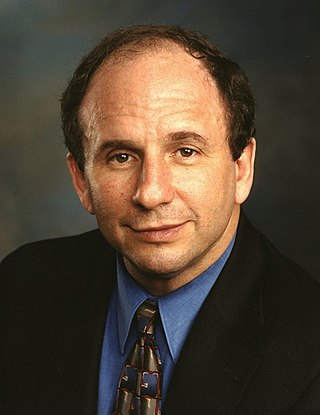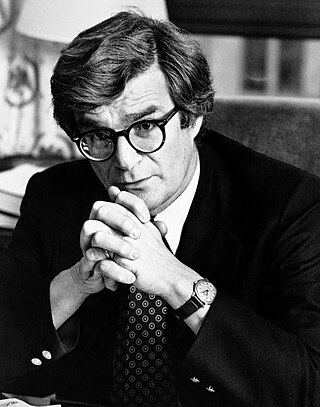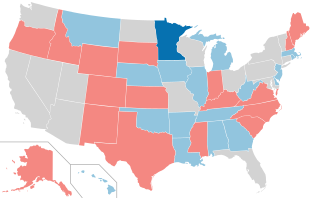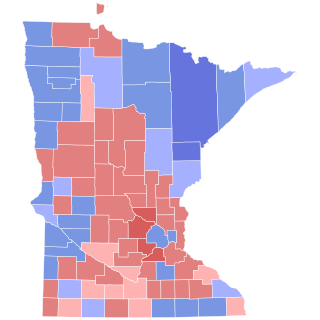
Paul David Wellstone was an American academic, author, and politician who represented Minnesota in the United States Senate from 1991 until he was killed in a plane crash near Eveleth, Minnesota, in 2002. A member of the Democratic Party (DFL), Wellstone was a leader of the populist and progressive wings of the party.

Wendell Richard "Wendy" Anderson was an American hockey player, politician, and the 33rd governor of Minnesota, serving from January 4, 1971, to December 29, 1976. In late 1976 he resigned as governor in order to be appointed to the U.S. Senate after Senator Walter Mondale was elected Vice President of the United States. Anderson served in the Senate from December 30, 1976, to December 29, 1978. After losing the 1978 Senate election to Rudy Boschwitz, he resigned a few days before the end of his term to give Boschwitz seniority.

Dean Malcolm Barkley is an American attorney and politician who briefly served as a United States Senator from Minnesota from 2002 to 2003 as a member of the Independence Party of Minnesota. The founder and chair of the Minnesota Reform Party, he was the chairman of Jesse Ventura's successful upset bid for governor of Minnesota in 1998. Ventura subsequently appointed him director of the state's Office of Strategic and Long Range Planning. After Senator Paul Wellstone died in a plane crash just weeks before the 2002 election, Ventura appointed Barkley to fill Wellstone's Senate seat. His brief tenure ended when Republican Norm Coleman was elected and sworn in to fill the seat.

Rudolph Ely “Rudy” Boschwitz is an American politician and businessman who served as a United States senator from Minnesota from 1978 until 1991. Boschwitz is a member of the Republican Party.

The 2002 United States Senate elections featured a series of fiercely contested elections that resulted in a victory for the Republican Party, which gained two seats and thus a narrow majority from the Democratic Party in the United States Senate. The Senate seats up for election, known as class 2 Senate seats, were last up for regular election in 1996. The election cycle was held on November 5, 2002, almost fourteen months after the September 11, 2001 attacks.

The 2000 United States Senate elections were held on November 7, 2000. The elections coincided with other federal and state elections, including the presidential election which was won by Republican George W. Bush. These elections took place six years after Republicans had won a net gain of eight seats in Senate Class 1. Despite George W. Bush's victory in the presidential election, the GOP lost 4 senate seats, the most a winning president's party has lost since the passage of the 17th amendment. This election marked the first election year since 1990 where Democrats made net gains in the Senate. Democrats defeated incumbent Republicans in Delaware, Michigan, Minnesota, Missouri, and Washington, and they won an open seat in Florida. In Missouri, the winner was elected posthumously. The Republicans defeated a Democratic incumbent in Virginia, and won an open seat in Nevada. Additionally, a Republican in Georgia died earlier in the year and a Democrat was appointed to replace him, who then went on to win the special election.

The 1996 United States Senate elections were held on November 5, with the 33 seats of Class 2 contested in regular elections. Special elections were also held to fill vacancies. They coincided with the presidential election of the same year, in which Democrat Bill Clinton was re-elected president.

The 1990 United States Senate elections were held on Tuesday, November 6, 1990, with the 33 seats of Class 2 contested in regular elections. Special elections were also held to fill vacancies. The Democratic Party increased its majority with a net gain of one seat from the Republican Party. The election cycle took place in the middle of President George H. W. Bush's term, and, as with most other midterm elections, the party not holding the presidency gained seats in Congress. Until 2022, this had been the only election cycle where only one U.S. Senate seat flipped parties.

The 1984 United States Senate elections were held on November 6, with the 33 seats of Class 2 contested in regular elections. They coincided with the landslide re-election of President Ronald Reagan in the presidential election. In spite of the lopsided presidential race, Reagan's Republican Party suffered a net loss of two Senate seats to the Democrats, although it retained control of the Senate with a reduced 53–47 majority. Democrats defeated incumbents in Illinois and Iowa, and won an open seat in Tennessee, while Republicans defeated an incumbent in Kentucky.

The 1978 United States Senate elections were held on November 7, in the middle of Democratic President Jimmy Carter's term. The 33 seats of Class 2 were contested in regular elections. Special elections were also held to fill vacancies.

The 1964 United States Senate elections were held on November 3. The 33 seats of Class 1 were contested in regular elections. Special elections were also held to fill vacancies. They coincided with the election of President Lyndon B. Johnson by an overwhelming majority, to a full term. His Democratic Party picked up a net two seats from the Republicans. As of 2023, this was the last time either party has had a two-thirds majority in the Senate, which allowed the Senate Democrats to override a veto, propose constitutional amendments, or convict and expel certain officials without any votes from Senate Republicans. However, internal divisions would have prevented the Democrats from having done so. The Senate election cycle coincided with Democratic gains in the House in the same year.

The 2002 United States Senate election in Minnesota took place on November 5, 2002. Incumbent Senator Paul Wellstone was running for a third term but died in a plane crash eleven days before the election. The Democratic–Farmer–Labor Party (DFL) quickly chose former Vice President and 1984 presidential nominee Walter Mondale to replace Wellstone on the ballot. Mondale had previously held the seat from 1964 to 1976, resigning to assume the vice presidency. He narrowly lost to Republican Norm Coleman, the former mayor of Saint Paul. The day before the election, Governor Jesse Ventura appointed the 1996 Independence Party candidate, Dean Barkley, to serve the remainder of Wellstone's term.

The 1990 Minnesota gubernatorial election took place on November 6, 1990. Independent-Republican Party State Auditor and challenger Arne Carlson defeated then Minnesota Democratic–Farmer–Labor Party Governor Rudy Perpich, who had defeated Mike Hatch for the Democratic nomination. This remains the last gubernatorial election in Minnesota to date in which an incumbent governor ran for reelection to a third term.

The 1996 United States Senate election in Minnesota was held on November 5, 1996. Incumbent Democrat Paul Wellstone won reelection to a second term defeating former Republican Senator Rudy Boschwitz in a rematch.
Jon Rieder Grunseth is a Minnesota businessman and politician. He was the 1990 Independent-Republican nominee for Governor of Minnesota. Grunseth won his party's endorsement and its primary election, but was forced to quit the race nine days before election day in the wake of a scandal. Until the 1990 governor's race, Grunseth had been the Vice President of Public Affairs at Ecolab, and chair of the Chemical Specialties Manufacturers Association. After the scandal, he lost his job at Ecolab, and he now lives and runs a cherry-growing operation in Australia.

Michelle Louise Helene Fischbach is an American attorney and politician who is the U.S. representative from Minnesota's 7th congressional district. The district, which is very rural, is Minnesota's largest congressional district and includes most of the western area of the state. A Republican, Fischbach served as the 49th lieutenant governor of Minnesota from 2018 until 2019. As of 2024, she is the most recent Republican to have held statewide office in Minnesota.

The 1990 United States elections were held on November 6 and elected the members of the 102nd United States Congress. The elections occurred in the middle of Republican President George H. W. Bush's term and during the Gulf War. The Democratic Party slightly built on their control of Congress.

The 1984 United States Senate election in Minnesota was held on November 6, 1984. Incumbent Republican U.S. Senator Rudy Boschwitz defeated Democratic challenger Joan Growe.

The 1978 United States Senate election in Minnesota was held on November 7, 1978. Incumbent Democratic U.S. Senator Wendell Anderson was defeated by Republican challenger Rudy Boschwitz.

The 2018 United States Senate special election in Minnesota took place on November 6, 2018, to elect a United States senator from Minnesota to replace incumbent Democratic senator Al Franken until the regular expiration of the term on January 3, 2021. Facing multiple accusations of sexual misconduct, Franken announced on December 7, 2017, that he would resign effective January 2, 2018. Governor Mark Dayton appointed Franken's successor, Tina Smith, on December 13, 2017, and she ran in the special election. This election coincided with a regularly scheduled U.S. Senate election for the Class 1 Senate seat, U.S. House elections, a gubernatorial election, State House elections, and other elections.




















